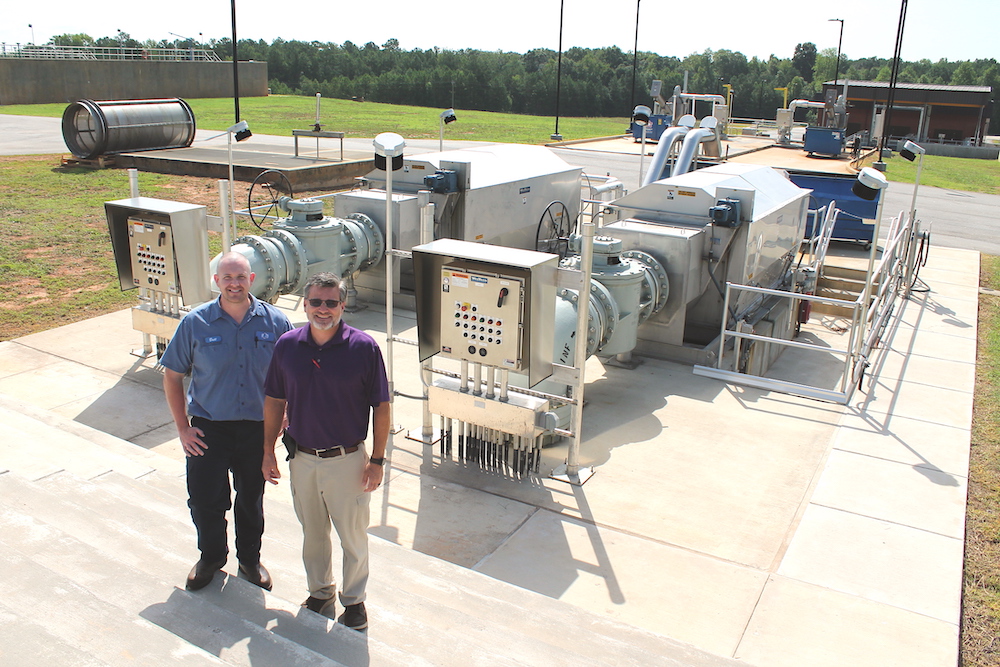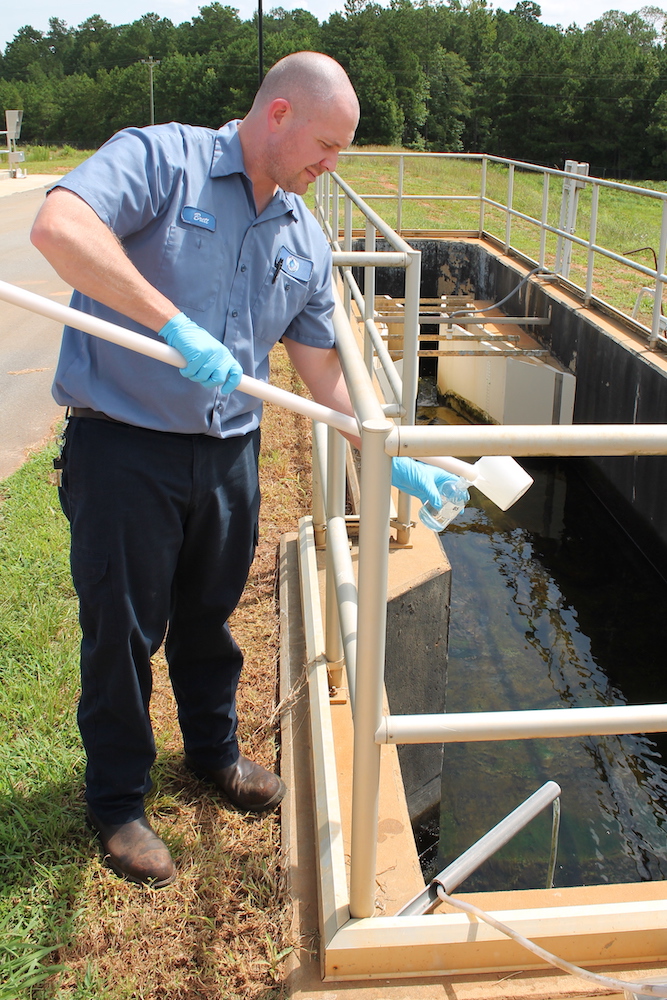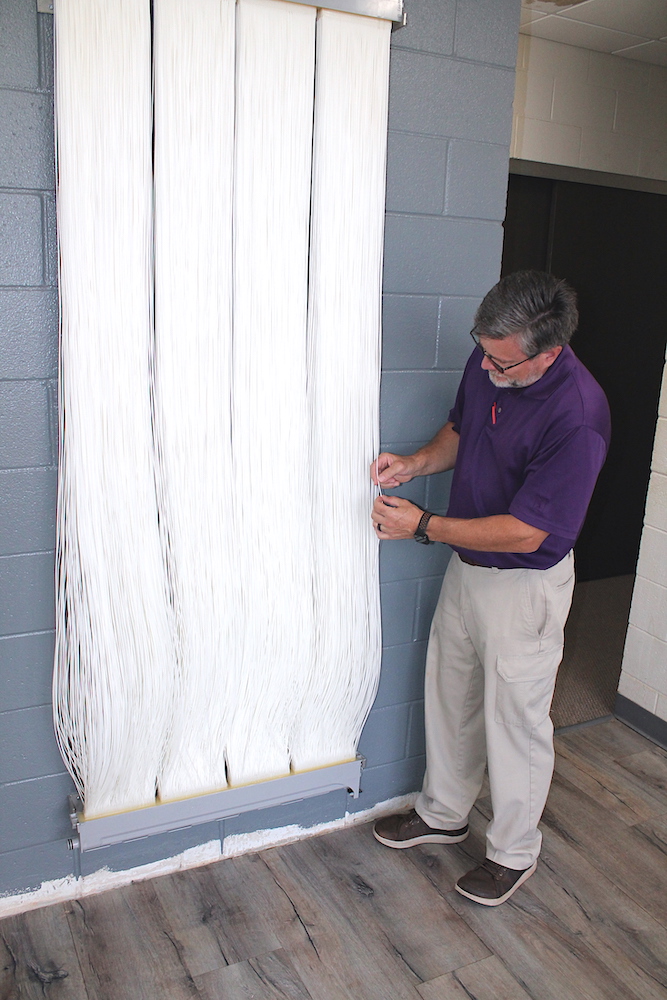Indian Creek Plant Passes the WET Test
With the Fall term of Henry County Schools off and running, local students soon will be preparing for exams. They’re not the only ones who are being tested this time of year.
are being tested this time of year.
The Henry County Water Authority’s (HCWA) new and improved Indian Creek Water Reclamation Facility (WRF) has completed a recent examination of its own, as required by the Georgia Environmental Protection Division (EPD), to make sure its wastewater effluent – the wastewater treated and permitted for direct discharge into Indian Creek – is up to par.
The Authority’s wastewater compliance laboratory staff facilitates a number of quality control tests annually, to verify that the utility’s treatment methods at all three of its water reclamation facilities are in compliance with permits for operation. Their work was rewarded last year by the Georgia Association of Water Professionals (GAWP) with the statewide Quality Control/Quality Assurance Award.
To maintain regulatory compliance at the HCWA Indian Creek WRF, the plant must pass what is called a Whole Effluent Toxicity (WET) Test. Four of these WET Test events have been conducted recently by a third-party, private lab – Environmental Resource Analyst in Auburn, Alabama – on behalf of the HCWA. This assures there are no potential compromises in testing objectivity. The results gathered this month verified that the HCWA Indian Creek Plant’s effluent is in compliance with state and federal regulations.
A WET Test measures the effect of wastewater effluent on a small fish species and water fleas. The organisms’ ability to survive, grow, and reproduce are analyzed at different effluent concentrations and then recorded. The bottom line is that the quality of effluent coming from this HCWA wastewater treatment facility – and being released into Indian Creek, locally – is of comparable or even higher quality than the water flowing in the stream. In fact, if you placed a sample of Indian Creek’s effluent next to HCWA tap water, you’d be hard pressed to tell which is which, because of the clarity and quality of the treated wastewater at this plant.
the effect of wastewater effluent on a small fish species and water fleas. The organisms’ ability to survive, grow, and reproduce are analyzed at different effluent concentrations and then recorded. The bottom line is that the quality of effluent coming from this HCWA wastewater treatment facility – and being released into Indian Creek, locally – is of comparable or even higher quality than the water flowing in the stream. In fact, if you placed a sample of Indian Creek’s effluent next to HCWA tap water, you’d be hard pressed to tell which is which, because of the clarity and quality of the treated wastewater at this plant.
That’s because of a nearly $20 million investment – and three-year planning and construction project that was completed this time last year – by the HCWA to install the best available treatment technologies in the industry at the Indian Creek WRF.
As a result of this major capital improvement to the HCWA system, the Authority transformed the Indian Creek WRF from a conventional plant using contact stabilization techniques into an advanced treatment facility using Membrane Bio Reactor (MBR) treatment technology.
Prior to the upgrades to the Indian Creek Plant, wastewater at the facility was treated to a point where it could be safely recycled via spray irrigation over a nearly 1,000-acre Land Application System (LAS) site. Today, the wastewater/effluent leaving the Indian Creek Plant is of such high quality that it can actually enhance the water quality within Indian Creek, providing a proven healthy habitat for fish and wildlife.
While the WET Tests offer the most current example of the stringent regulatory standards the Indian Creek Plant must follow, all three of the utility’s water reclamation facilities complete several specialized testing events annually, with oversight provided by the award-winning HCWA compliance laboratory located within the Walnut Creek WRF, to determine the quality and impact of effluent on the environment.
Cumulative test results this year from the Indian Creek WRF reveal that there are no toxic chemical pollutants, including metals, being released into Indian Creek. WET Tests and similar laboratory analyses look for 126 pollutants that Georgia EPD has determined as toxic, to make sure these potentially harmful substances are not present in wastewater effluen t, and thus transferred to local rivers, creeks and streams as a result of direct discharge.
t, and thus transferred to local rivers, creeks and streams as a result of direct discharge.
In addition to providing a higher quality effluent than before, the upgrades to the HCWA Indian Creek WRF also doubled the treatment capacity of the plant – from 1.5 million gallons per day (MGD) to 3 MGD. Additional wastewater treatment capacity for the growing areas of south Henry County is good news for economic and industrial development efforts, locally.
Within its $930 million 30-year Capital Improvement Plan (CIP), the HCWA intends to begin the process to upgrade and expand its largest wastewater treatment facility – the Walnut Creek Plant – by the end of the year. The design will increase treatment capacity and likewise transform it from a conventional wastewater treatment plant to an advanced treatment facility.
“It’s not just the unprecedented growth in Henry County that we’ve had to keep up with, it’s the continual changes and more stringent standards in regulatory oversight and permitting we have to be on top of as well,” says Lindy Farmer, HCWA General Manager. “Our reputation across in the industry is that we’re an Authority that does not cut corners, and we proactively invest in our system so that we can continue to be a model water and sewer utility in the state.”
#
Captions for Photos:
Top photo: Brett Howard (left) and Bill Banks (right) of the Henry County Water Authority review the operations and treatment processes at the new and improved Indian Creek Water Reclamation Facility, following approximately $20 million in recent capital improvements.
Middle photo: Brett Howard, HCWA Class 3 Wastewater Operator, takes a sample of effluent for testing from the Indian Creek Water Reclamation Facility. This treated wastewater looks as clear as tap water and enhances water quality when discharged into nearby Indian Creek.
Bottom photo: Bill Banks, HCWA Manager of Capital Projects, explains the use of membranes to provide advanced wastewater treatment at the Indian Creek Water Reclamation Facility. This new technology allows the HCWA to produce a high-quality effluent (treated wastewater) that is permitted for discharge into nearby Indian Creek to enhance its water quality.
Media contact:
Chris Wood, Ph.D.
P: 770-757-1681
E: john.wood@gcsu.edu or chris@jwapr.com
